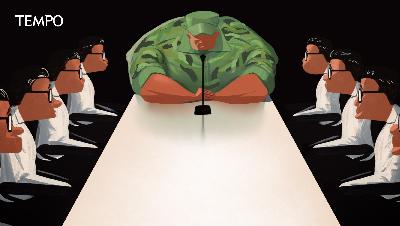Keeping Our Soldiers in the Barracks
Monday, March 3, 2025
Hundreds of active military officers are being trained to run SOEs and region-owned enterprises. Soldiers are meant for wars, not business.
arsip tempo : 174495672132.

PRESIDENT Prabowo Subianto is taking the military further into civilian affairs. His move to place hundreds of active officers in the management of state-owned-enterprises (SOEs) and region-owned enterprises (BUMDs) is in violation of the constitution and the Reformasi era’s military doctrine.
After appointing Maj. Gen. Novi Helmy Prasetya as the Chief Executive Officer (CEO) of the State Logistics Agency (Bulog), the government prepared 200 colonels and brigadier generals to manage SOEs and BUMDs. The Defense Ministry has been conducting business management and finance courses for these officers since early January 2025, with training focused on energy and food security issues, Prabowo’s two priority programs.
Although there has not been an official explanation about these active officers’ destinations, besides SOEs and BUMDs, there is a significant possibility that most will help run the millions of hectares of oil palm plantations proven to be in violation of regulations. Prior, the President had formed the Forest Area Regulation Task Force, appointing Defense Minister Sjafrie Sjamsoeddin as the Chair of its Steering Committee.
His move is out of bounds. We have had terrible experiences with the dual function of the military, placing soldiers not only as a military power but as elements able to perform all tasks, including those related to political, social, and economic affairs. The doctrine produced the authoritarian New Order regime that managed to stay in power for 32 years. During this period, the Indonesian Military (TNI) personnel were actively involved in politics and led SOEs.
Placing active members of the military in SOEs is also in violation of the law. Article 47, section 2 of the TNI Law firmly states that only institutions and offices in charge of political and state security, defense, state intelligence, national resilience, search and rescue, the president’s military secretariat, the narcotics agency, and the Supreme Court can be led by an active military member. To lead other institutions, active military officers must first retire early.
The influx of active military personnel in civilian institutions seems to be encouraged not only by the limited availability of positions in military organizations but also by the persistent doctrine that everything can only be resolved by the military. In his many speeches, Prabowo said he was certain that only the government, through the military, could control the commercial economy and means of production (state capitalism).
For this particular matter, perhaps Prabowo can emulate the position of Indonesia’s former president, Susilo Bambang Yudhoyono, who once asked active-duty soldiers to retire if they wish to enter politics or hold civilian posts.











